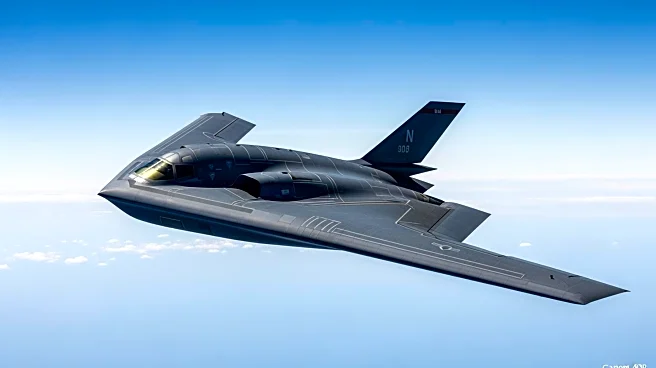What's Happening?
President Trump has announced the Pentagon's order for 28 new B-2 Spirit stealth bombers, following their recent deployment in strikes against Iranian nuclear facilities. The operation, named Operation
Midnight Hammer, involved seven B-2 bombers executing a 36-hour mission to target three Iranian nuclear sites. Col. Josh Wiitala, commander of the 509th Bomb Wing, highlighted the significance of the raid, describing it as one of the most consequential in his career. The B-2 bomber is noted for its combination of long-range capabilities, high payload, and stealth technology, which allows it to penetrate enemy airspace undetected. The mission was supported by stealth F-22 and F-35 fighters, ensuring the bombers' safe passage into Iranian airspace. The Massive Ordnance Penetrator bombs used were designed to target deep underground facilities, and the operation was executed flawlessly according to Chief Master Sgt. Frank Espinoza.
Why It's Important?
The successful deployment of B-2 bombers in Iran underscores the strategic importance of stealth technology in modern military operations. The Pentagon's decision to order additional B-2 bombers reflects a commitment to maintaining air superiority and enhancing the U.S. military's ability to conduct precision strikes against high-value targets. This development may influence global military dynamics, as other nations may seek to advance their own stealth capabilities in response. The operation also highlights the ongoing tensions between the U.S. and Iran, potentially impacting diplomatic relations and regional stability. The use of advanced military technology in such operations could lead to increased defense spending and further innovation in stealth and precision weaponry.
What's Next?
The Pentagon's order for new B-2 bombers suggests a continued focus on enhancing the U.S. military's stealth capabilities. As these bombers are integrated into the fleet, they may be deployed in future operations requiring precision strikes and stealth penetration. The successful mission against Iranian nuclear sites may prompt further military actions or diplomatic negotiations aimed at addressing nuclear proliferation concerns. Additionally, the development and deployment of advanced military technology may lead to increased scrutiny and debate over defense spending and strategic priorities within the U.S. government.
Beyond the Headlines
The use of stealth technology in military operations raises ethical and legal questions regarding the conduct of warfare and the potential for collateral damage. As military technology advances, there may be increased pressure to establish international norms and regulations governing the use of such capabilities. The reliance on stealth bombers also highlights the importance of cybersecurity and information warfare, as adversaries may seek to counter these advantages through electronic and cyber means. The broader implications of these developments may influence military strategy and defense policy in the coming years.









